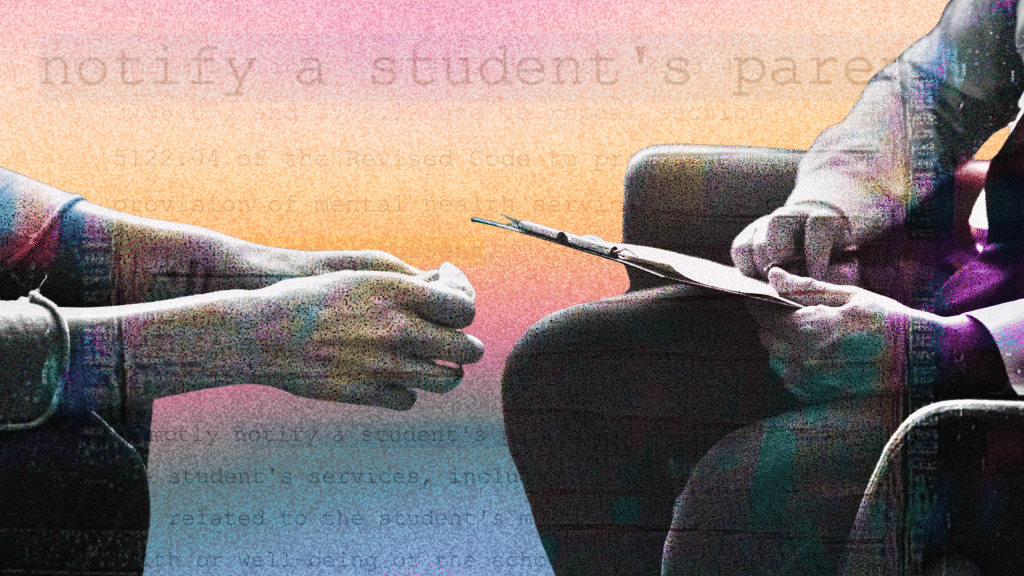Ohio House Bill (HB) 172 — which would eliminate a government program that allows some minors to obtain short-lived, emergency mental health services without the consent of a parent or legal guardian — held a second hearing Wednesday before members of the House Health Committee.
Currently, Ohio’s Mobile Response and Stabilization Services (MRSS) program. allows mental health professionals to provide short-lived outpatient mental health services to minors 14 years of age and older without obtaining consent from a parent or guardian.
HB 172 would remove this provision from the Ohio Revised Code by requiring a mental health professional to obtain consent from a minor’s parent or guardian before providing any crisis intervention or mental health services – which could result in increased risk of harm to LGBTQ+ youth statewide.

Current law, intended to serve youth in crisis, allows for a maximum of six sessions or 30 days of mental health care, whichever comes first.
Mental health professionals cannot prescribe medications during the short-lived treatment window and must complete treatment and obtain consent from a parent or legal guardian immediately after the short-lived window has passed.
More broadly, the bill is part of a larger effort by House Republicans to strengthen “parents’ rights” in schools and health care facilities following the passage of HB 8, the “Parents’ Bill of Rights,” which requires teachers and school staff to report LGBTQ+ students to their parents or guardians, regardless of suspicions of anti-LGBTQ+ abuse at home.
Push for ‘parents’ rights’
Members of the House of Representatives Health Committee listened public testimony The bill was supported by several conservative and Christian organizations, including Voters value Ohio President John Stover.
Stover – who is also a Christian deacon and trustee of Cleveland Baptist Church – directly cited the Parents’ Bill of Rights, alleging inconsistency between the MRSS program and the standards established under the modern law.
“HB 8 details school district requirements if a child has mental health issues,” he said. “How is it that there is a law requiring parental notification and yet the government can have a program – the MRSS program – where parents are not notified?”
The increased emphasis on “parental rights” in conservative political spaces is often tied directly to anti-transgender legislation and is based on the baseless narrative that teachers and health care providers encourage LGBTQ+ and transgender youth to hide their identity from their parents or guardians.
Stover did not directly mention LGBTQ+ youth during his testimony, but suggested that discussing LGBTQ+ identity with a mental health professional should result in notification to a parent or legal guardian.
“HB 8 was very specific,” he told committee members. “Any mental health problem that is not related to a crime should be reported to parents.”
Linda Harvey – founder and president of the Columbus-based company anti-LGBTQ+ hate group Mission: America – he also gave public testimony in support of the bill. Harvey repeatedly used the phrase “gender ideology,” a term identified by both sides CONTENT, Human Rights Guard and Southern Poverty Law Center (SPLC) as a whistleblower against transgenderism.
Democrats raise concerns
In written sponsor testimony filed in May, lead sponsor and conservative Christian pastor, Republican Jonathan Newman (R-Troy), stated that providing mental health services to minors without parental consent is “wrong!” – even through a short-lived emergency window.
However, medical research suggests otherwise.
Minor provisions regarding medical consent that allow juvenile people to support themselves a certain level of confidentiality with your healthcare provider before age 18 are associated with better health outcomes and, over time, greater access to care.
Republican Gov. Mike DeWine praised the program, which also offers direct mobile crisis intervention services and follow-up care lasting up to six weeks with a team of mental health professionals and the minor’s parents or legal guardians.
“The MRSS program is one of the most important tools we have at our disposal to respond quickly and effectively when a child is in crisis,” DeWine said earlier this year in announcing expansion of program services include each of Ohio’s 88 counties.
Rep. Karen Brownlee (D-Symmes Twp) previously worked as a licensed school counselor and saw firsthand the benefits of the emergency mental health services that MRSS provides.
“The MRSS program has had a tremendous impact on children and their families,” Brownlee said. “I want to say very clearly: This program has been a huge success. The way the governor set it up is based on family involvement to make things better.”
Brownlee, one of only four Democrats on the 13-member committee, rejected Stover’s suggestion that mental health professionals and educators could operate the law to “keep parents in the dark” about their child’s LGBTQ+ identity.
“I would say that in almost every case in which MRSS is involved, the so-called [parents or] “Caregivers are being notified,” she said. “The only time they would not be notified is if there is an immediate risk to the child.”
Democrats raise concerns
If school administrators or a mental health professional determine that a child’s parent or guardian has committed a “crime of abuse or neglect” against the child, they are required to report the crime to law enforcement.
However, LGBTQ+ adults are reporting far up highmer rates With identity-based abuse and mistreatment from parents, legal guardians and other guardians during childhood and adolescence than their heterosexual peers.
Rep. Rachel Baker (D-Cincinnati) said giving juvenile people access to several semi-secret mental health sessions was a key step in identifying and reporting violence. Baker said a juvenile person may need more than one meeting with a mental health professional to feel comfortable disclosing abuse from a parent or guardian.
“I don’t know how this is going to play out unless disclosing the abuse is the first thing they tell the doctor,” Baker said. “It takes a conversation to know that a crime has occurred. I want to make sure we protect that conversation.”
Additionally, Rep. Michele Grim (R-Toledo) – who previously volunteered on a rape hotline – said the law could also discourage minor victims of sexual assault from reporting incidents if they know their parent or guardian needs to be notified.
“[HB 172] can limit a rape crisis counselor’s ability to provide a protected space with a trusted adult who is trained to deal with very complicated situations,” Grim said.
The bill’s co-sponsors include disgraced Republican Rodney Creech (R-West Alexandra), who was stripped of his position on the committee in April and were told to resign after a minor family member accused him of sexual assault.
Creech has since publicly denied allegations that he got into bed with the teenager while partially clothed and erect, calling them “political” in nature. 🔥
Ignite the action
- Buckeye Flame Ohio’s 2025 LGBTQ+ Legislation Guide can be found here.
- To register to vote or check your eligibility to vote in Ohio, click here.
- To find the contact information for your Ohio State Representative, click here.
- To find contact information for an Ohio State Senator, click here.
- If you are a juvenile LGBTQ+ person in crisis, please contact Trevor’s project: 866-4-U-Trevor.
- If you are a transgender adult in crisis, please contact: National Trans Lifeline: 877-565-8860


